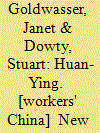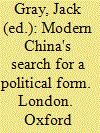| Srl | Item |
| 1 |
ID:
164216


|
|
|
|
|
| Summary/Abstract |
SOCIALISM with Chinese characteristics has entered a new era. This important political statement was made at the 19th CPC Congress. It holds great significance for advancing party and national affairs. The first year of implementation of the decisions of the 19th CPC Congress and 40 years of reform and opening-up in China make it clear that this policy will continue and bring the world even more opportunities.
|
|
|
|
|
|
|
|
|
|
|
|
|
|
|
|
| 2 |
ID:
088180


|
|
|
|
|
| Publication |
Aldershot, Ashgate, 2000.
|
| Description |
v. 3; xxxiii, 524p.
|
| Standard Number |
01840144831
|
|
|
|
|
|
|
|
|
|
|
|
Copies: C:1/I:0,R:0,Q:0
Circulation
| Accession# | Call# | Current Location | Status | Policy | Location |
| 043974 | 320.951/CHU 043974 | Main | On Shelf | General | |
|
|
|
|
| 3 |
ID:
044695


|
|
|
|
|
| Publication |
New York, Monthly Review Press, 1975.
|
| Description |
404p.Hbk
|
| Standard Number |
0853453377
|
|
|
|
|
|
|
|
|
|
|
|
Copies: C:1/I:0,R:0,Q:0
Circulation
| Accession# | Call# | Current Location | Status | Policy | Location |
| 014944 | 915.1035/GOL 014944 | Main | On Shelf | General | |
|
|
|
|
| 4 |
ID:
122312


|
|
|
|
|
| Publication |
2013.
|
| Summary/Abstract |
The Rectification Campaign of 1957 prompted a vibrant debate about Chinese socialism. This debate contained three analytically distinct perspectives on the intellectual, each corresponding to a specific vision of socialist development. The "legislator" perspective, championed by college students, demanded for intellectuals the right to help to define socialism. Leading intellectuals sponsored the "reformer" view, which argued that intellectuals were vital to improving governance under the Chinese Communist Party. The state's "red-and-expert" ideal demanded intellectuals' devotion to the working class and the acceleration of professional training for members of the working class. These perspectives promoted, respectively, a modernist, a traditionalist and a borderline Gramscian path of development-none of which was embraced by the Mao regime or post-Mao leaderships. Recovering these visions enriches our understanding of Chinese socialism; they offer powerful contrasts to extremes of both a subsequent Maoism and the current widening inequalities, official corruption and abuses.
|
|
|
|
|
|
|
|
|
|
|
|
|
|
|
|
| 5 |
ID:
029723


|
|
|
|
|
| Publication |
London, Oxford University Press, 1969.
|
| Description |
xii, 379p.hbk
|
|
|
|
|
|
|
|
|
|
|
|
Copies: C:1/I:0,R:0,Q:0
Circulation
| Accession# | Call# | Current Location | Status | Policy | Location |
| 002103 | 951.04/GRA 002103 | Main | On Shelf | General | |
|
|
|
|
| 6 |
ID:
158267


|
|
|
|
|
| Summary/Abstract |
In post-Mao China, a group of Chinese intellectuals who formed what became the New Left (新左派) sought to renew socialism in China in a context of globalization and the rise of social inequalities they associated with neo-liberalism. As they saw it, China’s market reform and opening to the world had not brought greater equality and prosperity for all Chinese citizens. As part of China Information’s research dialogue on the intellectual public sphere in China, this article provides a historical survey of the development of the contemporary Chinese New Left, exploring the range of ideas that characterized this intellectual movement. It takes as its focus four of the most prominent New Left figures and their positions in the ongoing debate about China’s future: Wang Shaoguang, Cui Zhiyuan, Wang Hui, and Gan Yang.
|
|
|
|
|
|
|
|
|
|
|
|
|
|
|
|